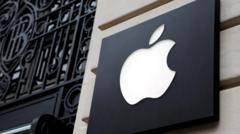In a noteworthy turn of events, a U.S. district judge has referred Apple for a potential criminal contempt investigation after determining that the tech giant intentionally violated her injunction connected to a high-profile case initiated by Epic Games, the creator of the globally popular game Fortnite. The judge, Yvonne Gonzalez Rogers, stated that an Apple executive had "outright lied" under oath during the proceedings.
The injunction was issued to prevent Apple from engaging in anti-competitive behaviors and to allow alternative payment options in its App Store. Following this ruling, which dates back to 2021, Apple was mandated to open its platform to third-party payment systems, addressing concerns regarding the company's substantial commission fees, which can reach up to 30% on app purchases.
In response to the ruling handed down on Wednesday, Apple expressed deep disagreement and announced plans to comply with the court's order while pursuing an appeal. The case centers on allegations from Epic Games that Apple's restrictions on payment options amounted to monopolistic practices, limiting developers' ability to link customers to their purchasing platforms, whether for gaming or other services like movie streaming.
In her contempt order, Judge Gonzalez Rogers highlighted that Apple’s actions were intended to stifle competition and emphasized that such behavior "will not be tolerated." She referred to internal documents from the company, stating they revealed Apple’s conscious decision to disregard the injunction. The judge noted that Apple’s CEO, Tim Cook, ignored advisories from executive Phillip Schiller, who advocated for compliance, permitting CFO Luca Maestri to dissuade him otherwise.
Furthermore, the judge accused Apple's vice-president of finance, Alex Roman, of perjury. One significant way Apple allegedly attempted to sidestep the injunction involved introducing a 27% commission on off-app purchases, a shift from their previous policy of charging nothing. The company also reportedly created additional barriers to hinder customers from utilizing competing payment platforms.
In reaction to the ruling, Epic Games' founder Tim Sweeney announced on social media that Fortnite would return to the iOS App Store next week, proposing a resolution: if Apple allowed the court’s favorable framework for payment options to be applied globally, Epic would cease ongoing litigation and restore Fortnite across the board. Sweeney emphasized that the fees Apple traditionally collected on web transactions no longer held legality, marking a defeat for what he termed the "Apple Tax."



















